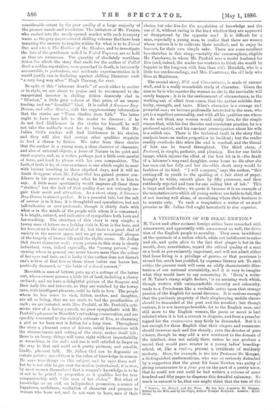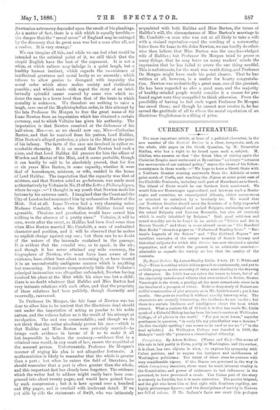A VINDICATION OF SIR ISAAC NEWTON.*
M. TAMS and other eminent foreign critics have remarked with amazement, and apparently with amusement as well, the devo- tion of the English people to morality. They seem bewildered at the spectacle of a nation which, while not indifferent to cakes and ale, and quite alive to the fact that ginger is hot in the mouth, does, nevertheless, regard the ethical quality of a man or a book as pre-eminently important, and will not admit either that loose living is a privilege of genius, or that prurience is atoned for, much less justified, by supreme literary art. To such critics the present work will seem an oddly characteristic illus- tration of our national eccentricity, and it is easy to imagine what they would have to say concerning it. ' Here,' a writer of M. Taine's stamp might declare, is an amazing work which, though written with unimpeachable sincerity and solemnity, reads to a Frenchman like a veritable satire upon that strange passion of the English for moral decorum. It is curious enough that the puritanic propriety of their shopkeeping middle classes should be demanded of the poet and the novelist ; but though curious, it is not incomprehensible, for to the English man, and still more to the English woman, the poem or novel is best relished when it is but a sermon in disguise, and from a preacher regard for the convenances may fairly be demanded. But it is not enough for these English that their singers and romancers should forswear sack and live cleanly; even the devotee of pure science, though he may add a new continent to the domain of the intellect, does not satisfy them unless he can produce a record that would pass muster in a young ladies' boarding- school, or, like a rosliwe, present a certificate of maidenly modesty. Here, for example, is the late Professor De Morgan, a distinguished mathematician, who was so seriously disturbed by a suggestion that the great Sir Isaac Newton was guilty of giving countenance to a faux pas on the part of a pretty niece, that he could not rest until he had written a volume of some hundred and fifty pages to disprove this dreadful calumny. So much in earnest is he, that one might think that the fate of the • Newton, his Prised, and his Ms.'s. By the lute Augustus De Morgan. Edited by his Wife and by his Pupil, Arthar Cowper Ittuyard. London : Elliot Stock.
Newtonian astronomy depended upon the result of his pleadings. As a matter of fact, there is a risk which is equally terrible,— the danger that the "moral sense" of England may be outraged by the discovery that its great man was but a man after all, not a rosfere. It is very strange.'
We can imagine all this, and while we can feel what would be intended as the satirical point of it, we still think that the stupid English have the best of the argument. It is not a whim, at which culture may indulge in a quiet laugh, but a healthy human instinct, which regards the co-existence of intellectual greatness and moral laxity as an anomaly ; which refuses to allow genius to disregard with impunity the moral order which alone makes society and civilisation possible ; and which reads with regret the story of an intel- lectually splendid career marred by some vice which re- duces the man to a lower level than that of the brute to which morality is unknown. We therefore see nothing to raise a Iaugh, save one of the Mephistophelian order, in this attempt by the late Professor De Morgan to free the great name of Sir Isaac Newton from an imputation which has obtained a certain currency, and to which Voltaire has given his authority. The imputation is that Newton connived at the dishonour of his half-niece, Mrs.—or, as we should now say, Miss—Catherine Barton, and that he received from his patron, Lord Halifax, Miss Barton's alleged protector, a place in the Mint as the price of his infamy. The facts of the case are involved in rather re- markable obscurity. It is on record that Newton had such a niece, and that Lord Halifax did procure for him the offices of Warden and Master of the Mint, and it seems probable, though it can hardly be said to be absolutely proved, that for five or six years Miss Barton, in some capacity, whether it were that of housekeeper, mistress, or wife, resided in the house of Lord Halifax. The imputation that the capacity was that of mistress, and that Newton acted as go-between, was made most authoritatively by Voltaire in No. 21 of the Letires Philosophiques, where he says :—" I thought in my youth that Newton made his fortune by his extreme merit. I imagined that the Court and the City of London had nominated him by acclamation Master of the Mint. Not at all. Isaac Newton had a very charming neice, Madame Conduitt, whom the Minister Halifax found very agreeable. Elusions and gravitation would have served him nothing in the absence of a pretty niece." Voltaire, it will be seen, wrote after the event, as Halifax had been dead some time when Miss Barton married Mr. Conduitt, a man of undoubted character and position, and it will be observed that he makes no explicit charge against any one ; but there can be no doubt of the nature of the innuendo contained in the passage. It is evident that the scandal was, so to speak, in the air ; and though it has never attained any wide currency, the biographers of Newton, who must have been aware of its existence, have either been silent concerning it, or have treated it in an uncomfortably ambiguous manner which is anything but reassuring. It matters comparatively little that Voltaire's principal insinuation was altogether unfounded, Newton having received his place at the Mint while his niece was but a child ; there is no doubt whatever that Halifax and Miss Barton had very intimate relations with each other, and that the propriety of these relations had been publicly, though discreetly and reservedly, canvassed.
To Professor De Morgan, the fair fame of Newton was too dear to allow him to be content that the illustrious dead should rest under the imputation of acting as pandar to his noble patron, and the volume before us is the result of his attempt at exculpation. The end was commendable ; and though we do not think that the writer absolutely proves his case—which is that Halifax and Miss Barton were privately married—he brings such evidence in favour of it as to make it all but impossible to believe the contrary,—evidence that in a criminal case would, in any court of law, ensure the acquittal of the accused person. Unfortunately, Professor De Morgan's manner of urging his plea is not altogether fortunate. A mathematician is likely to remember that the whole is greater than a part ; but when he enters the field of literature, he should remember that a part is often greater than the whole, and this important fact has clearly been forgotten. The evidence which the writer had to adduce might easily have been com- pressed into about twenty pages, and would have gained force by such compression ; but it is here spread over a hundred and fifty pages, and is overlaid with irrelevant detail. If we put side by side the statements of Swift, who was intimately acquainted with both Halifax and Miss Barton, the terms of Halifax's will, the circumstances of Miss Barton's marriage to Mr. Conduitt—a man who was not at all likely to take a wife with a stained reputation—and the wording of a noteworthy letter from Sir Isaac to Sir John Newton, we can hardly do other- wise than believe that Miss Barton was the unacknowledged wife of Halifax ; but Professor De Morgan tried. to prove so many things, that he may leave on many readers' minds the impression that be has failed to prove the one thing needful. This is unfortunate, for the work was worth doing, and Professor De Morgan might have made his point clearer. That be has written at all, however, is a matter for hearty congratula- tion. Newton was undoubtedly a great man, one of the greatest. He has been regarded as also a good man, and the majority of healthy-minded people would consider it a reason for pro- found regret were they compelled to think otherwise. From the possibility of having to feel such regret Professor De Morgan has saved them ; and though he cannot now receive it, he has earned the gratitude of all to whom the moral reputation of an illustrious Englishman is a thing of price.





































 Previous page
Previous page